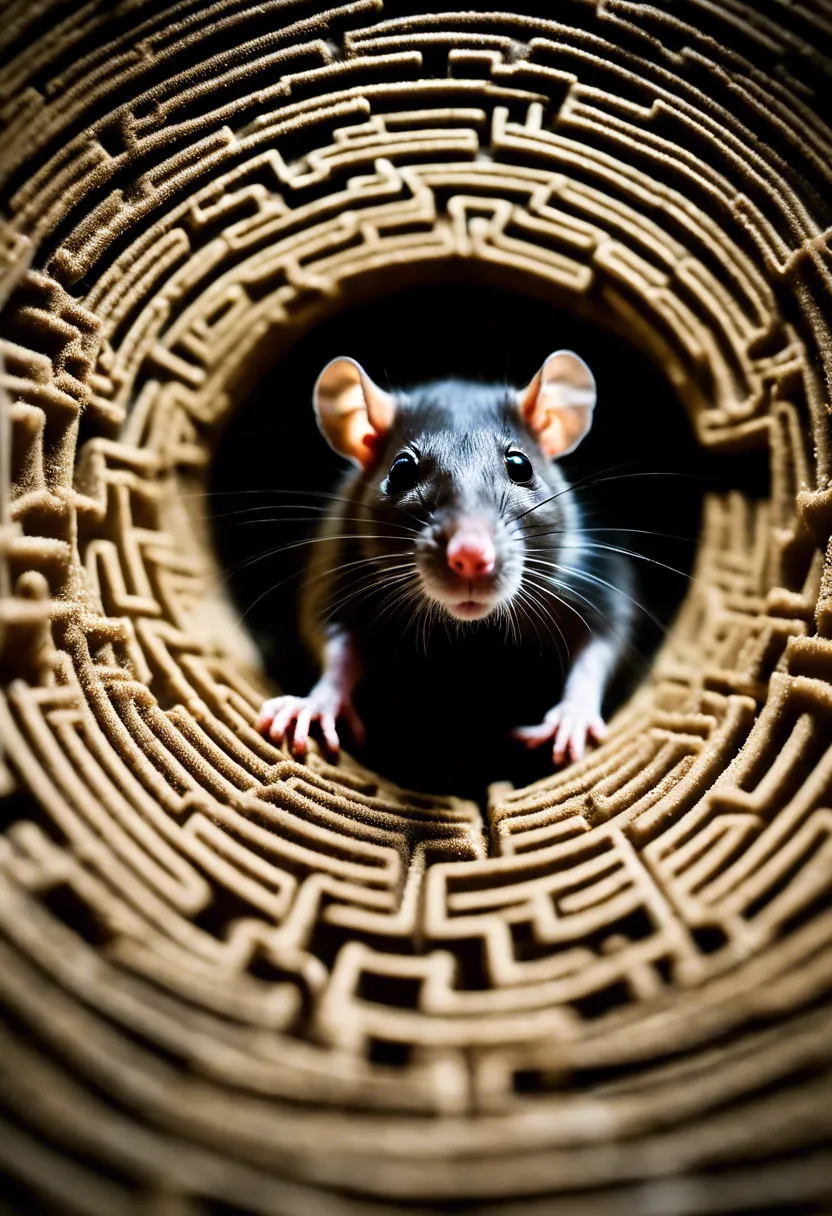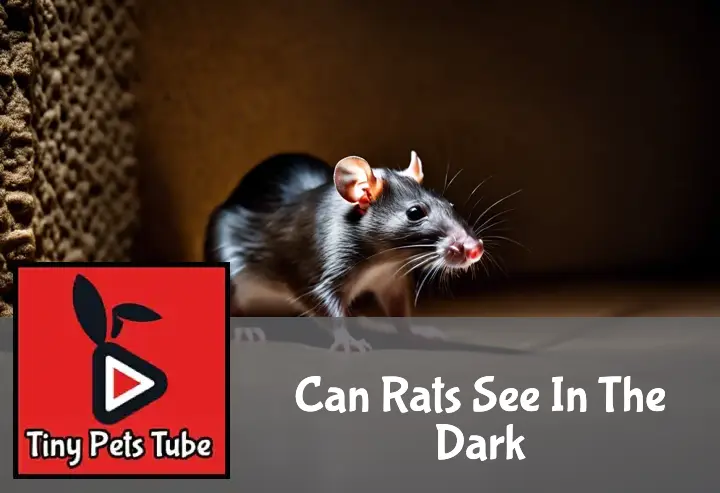Ever had a late-night encounter with a rat and wondered, Can Rats See In The Dark? Well, you’re not alone. This question has intrigued many of us, especially those who’ve been startled by these nocturnal creatures in the wee hours.
In this blog post, we’ll delve into the fascinating world of rat vision. We’ll uncover how their eyes work, compare it with our human vision, and debunk some common misconceptions. So buckle up and keep reading about ‘Can Rats See In The Dark?’ It’s going to be an enlightening ride!
Key Takeaways
- Rats have poor vision in general, but they can see better in low light conditions than humans.
- They use a combination of their other heightened senses such as smell and touch to navigate in the dark.
- Rats’ eyes contain more rod cells, which are sensitive to light and motion, helping them detect danger even in darkness.
- Their ability to see in the dark is not perfect, but it’s sufficient for their survival needs.

Understanding Rat Vision
Rats have a fascinating way of seeing the world, especially when it comes to navigating in the dark. Let’s dive into what makes rat vision so unique.
The Anatomy of a Rat’s Eye
When we talk about rodent eye structure, we’re looking at some pretty nifty adaptations that give rats an edge in the darkness. Unlike humans, rats have a larger proportion of rod cells in their rat retina, which are super sensitive to light and motion. This means they might not be reading the fine print anytime soon (not that they’d want to), but they can detect movement and shapes in low light much better than we can.
Another cool feature is the positioning and structure of their eyes. Rats’ eyes are on the sides of their heads, giving them a wider field of view. Think about it like having built-in panoramic vision – handy for spotting sneaky predators or humans trying to sneak up with treats. This ocular setup, combined with their night vision adaptation, makes them adept at scurrying around after dark without bumping into things.
How Rats Perceive Light and Shadows
Now, onto how these critters handle light and shadows. Thanks to those rod cells we talked about, rats are like little night-time ninjas. They don’t need bright lights to see where they’re going; instead, they use subtle changes in lighting and shadows to navigate their environment. It’s kind of like how you might use streetlights and moonlight to find your way home after a late-night snack run – except rats are doing this all the time.
This rat light sensitivity plays a huge role in their survival. Being able to move around effectively under the cover of darkness keeps them safe from predators who rely on daylight or sharp visual acuity to hunt. Plus, being nocturnal animals, this ability ensures they can go about their rat business undisturbed, whether it’s finding food or exploring new territories. So next time you see a rat darting confidently through dimly lit spaces, remember: it’s all thanks to their remarkable navigating in darkness skills.
Night Vision in Rats
Ever wondered if Can Rats See In The Dark? Well, these furry little night owls have some pretty neat tricks up their sleeves, or should we say, in their eyes!
The Role of Rod Cells in Night Vision
Rats, those sneaky little creatures that scurry around at night, have a secret weapon for navigating the dark: rod cells in rats. These cells are like tiny biological night-vision goggles packed into their eyes. They’re specially designed to soak up even the faintest light, making rats pretty darn good at seeing when we’d be stumbling around blindly.
The magic behind this night vision biology lies in the structure of these rod cells. Unlike humans who struggle to see without a decent amount of light, rats have an abundance of these photoreceptor cells. This means they can catch more glimpses of the world under the moon’s soft glow. It’s all about capturing and making the most out of every sliver of light – a real-life superpower if you ask me.
Adaptations for Nocturnal Life
But it’s not just their eyes that give rats an edge in the dark; they’ve got a whole arsenal of nocturnal adaptations in rats working for them. For starters, their hearing and smell go into overdrive when the sun goes down. Imagine being able to hear a cheese wrapper from three rooms away or sniff out a midnight snack hidden deep in a kitchen cupboard – that’s your average rat on any given night.
Then there’s their nighttime activity patterns. While we’re cozying up with Netflix, rats are hitting their stride. They’ve adapted to be most active when predators are least likely to spot them. It’s like having an all-access pass to explore without bumping into trouble – well, unless it’s human-made trouble like traps or brooms! Their keen sensory mechanisms aren’t just about survival; they turn the night into a playground for these nocturnal rodents.

Comparing Rat Vision to Human Vision

When it comes to seeing the world, rats and humans have quite different views. Let’s dive into how their visions contrast, especially in terms of color and depth perception. These differences aren’t just random; they’re all about survival.
Differences in Color Perception
Rats see the world differently from us, especially when it comes to colors. This is because their eyes are primarily equipped with rod cells, which are great for low-light conditions but not so hot for color vision. Humans, on the other hand, have a good mix of rods and cones, allowing us to enjoy a rainbow of colors. Rats mostly see in shades of gray, but they can detect some colors thanks to a few cone cells.
The structure of a rat’s eye means they’re tuned more into movement and night vision rather than enjoying the full spectrum of colors like we do. This adaptation helps them avoid predators under the cover of darkness or detect food sources. So while we’re admiring a beautiful sunset, our furry friends are more focused on what moves in the twilight.
Differences in Depth Perception
Now let’s talk about how rats perceive depth compared to us humans. One major player here is binocular vision, which both species have but use differently. Humans have a wide overlap in our field of view from both eyes, giving us excellent depth perception and spatial awareness.
Rats, however, have their eyes placed more on the sides of their heads. This setup gives them a broad field of view – almost 360 degrees – but less overlap means their binocular vision isn’t as sharp as ours for gauging distances accurately. Instead, rats rely heavily on motion parallax – moving their heads around to get a better sense of how far away objects are.
This difference is crucial for their survival; being able to spot predators or navigate through tight spaces without needing the precise depth perception humans depend on. It’s all about staying safe and finding food in their environment, proving once again that nature equips each creature perfectly for its unique lifestyle.
Scientific Studies on Rat Night Vision
Diving into the nitty-gritty of rat night vision research reveals a fascinating world. Scientists have been busy uncovering how these nocturnal rodents navigate the dark, and what they’ve found is pretty cool.
Key Findings from Research
Recent studies have shed some light on just how rats manage to scurry around so confidently when the lights go out. It turns out, their nocturnal eyesight abilities aren’t about seeing in pitch black but making the most of minimal light. Researchers discovered that rats have a knack for low-light navigation, thanks to their eyes’ unique structure, allowing them to detect movements and shapes in dim conditions better than we previously thought.
This doesn’t mean they have superhero vision or anything. Instead, their visual acuity in darkness is adapted perfectly for their nighttime escapades. These findings are crucial because they help us understand not just how rats see but how they interact with their environment when it’s lights out.
Implications for Understanding Rat Behavior
So, what does all this mean for understanding those sneaky little creatures? For starters, realizing that vision plays a significant role in rat behavior helps explain why they’re such successful nocturnal critters. Their ability to navigate and find food under the cover of darkness isn’t just luck; it’s an evolved survival strategy.
Moreover, this insight into rat vision and behavior highlights why rats prefer certain habitats over others. They’re not just looking for food and shelter but environments where their sensory-driven behaviors give them an edge. This knowledge could be key in managing rat populations and preventing infestations by considering how environmental changes affect their natural behaviors.
In essence, piecing together how rats see in the dark gives us a clearer picture of their world. It’s like we’ve switched on a nightlight in the study of nocturnal rodents’ sight, illuminating both the challenges and opportunities in understanding and coexisting with these fascinating creatures.
Practical Applications of Rats’ Night Vision
Understanding rat night vision applications is crucial for enhancing human activities, particularly in laboratory experiments and pest control strategies. It’s fascinating how these little nocturnal creatures can influence significant advancements in both fields.
Use in Laboratory Experiments
When it comes to laboratory experiments with rats, their ability to see in the dark plays a pivotal role. Researchers need to consider this when designing studies, especially those focusing on behavioral studies on rats or drug testing accuracy. The fact that rats are more active and comfortable in dimly lit environments means that the environmental conditions for lab rats must be carefully controlled to obtain accurate results.
Moreover, monitoring nocturnal activity becomes essential in understanding how certain drugs affect behavior or physiological responses. This aspect of rat vision research highlights the importance of creating an environment that mimics their natural habitat as closely as possible. By doing so, scientists can ensure the reliability of their findings and make significant strides in medical research.
Impact on Pest Control Strategies
The knowledge of can rats see in the dark significantly influences pest control techniques. Understanding the nocturnal habits of pests, like rats, allows for the development of more effective rat population management strategies. Traditional methods are being supplemented or replaced by innovative rat traps that take advantage of rats’ night-time activity patterns.
For instance, traps that are more effective under low light conditions or those that mimic the darkness can lead to higher capture rates. This insight into their behavior not only improves the effectiveness of pest strategies but also helps in devising humane ways to manage rat populations without causing unnecessary harm. It’s a game-changer for cities and homes looking to keep these unwelcome guests at bay while respecting wildlife welfare.
Common Misconceptions About Rats’ Night Vision
Let’s clear the air on one thing: Can Rats See In The Dark? Well, it’s not as straightforward as a yes or no. There are heaps of myths floating around about rats and their night-time escapades.
Debunking Myths
First off, many folks reckon rats have some sort of superpower that lets them see in pitch black like they’ve got built-in night goggles. Not quite right, folks. While it’s true rats are more active at night, their vision isn’t the superhero kind many believe it to be.
Instead of relying solely on their eyesight, these clever critters use their whiskers and keen sense of smell to navigate the darkness. So, while they might not be blind as bats (which, by the way, aren’t blind either), they’re definitely not seeing in high-definition color in the dead of night.
Another common fib is that all rodents have the same nocturnal animals eyesight capabilities. Nope, not even close. Each rodent species has its own set of peepers with varying degrees of effectiveness when the lights go out.
Facts vs Fiction
Now for some real talk: rats do have a certain level of night vision, but it’s nothing like what you’ve seen in superhero movies. Their eyes are adapted to low light rather than complete darkness, which helps them skitter about when the sun goes down.
Scientific studies show that rat vision is indeed optimized for dusk and dawn – times when there’s just enough light to make out shapes but not enough for detailed sightseeing tours. This twilight vision helps them avoid predators while searching for food.
So there you have it – while rats can’t exactly see in total darkness, they’re not flying blind either. Their abilities lie somewhere between the tall tales and the hard truths, making them fascinating creatures rather than mythical beings with supernatural sight.

To Wrap Up
So, to put a lid on this nocturnal mystery, yes, Can Rats See In The Dark. They’re like tiny superheroes with night vision goggles!
But remember, their sight isn’t perfect – it’s more like seeing through a foggy window on a rainy day. So keep your cheese safe and your eyes peeled for these little night crawlers!


